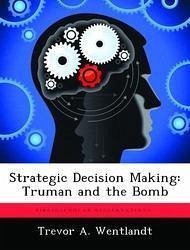
Strategic Decision Making: Truman and the Bomb
Versandkostenfrei!
Versandfertig in über 4 Wochen
52,99 €
inkl. MwSt.

PAYBACK Punkte
26 °P sammeln!
President Harry S. Truman's decision to drop the atomic bombs on the Japanese home islands in 1945 was a continuation of President Franklin D. Roosevelt's atomic legacy. With Roosevelt's untimely death an unprepared Truman was thrust into the presidency. He had neither the executive political background nor necessary mentoring from President Roosevelt to rely on. Instead--in his moment of crisis--Truman deliberately sought out Roosevelt's domestic, foreign and war legacy. In order to piece together Roosevelt's legacy Truman turned to Roosevelt's advisors and the fallen president's written docu...
President Harry S. Truman's decision to drop the atomic bombs on the Japanese home islands in 1945 was a continuation of President Franklin D. Roosevelt's atomic legacy. With Roosevelt's untimely death an unprepared Truman was thrust into the presidency. He had neither the executive political background nor necessary mentoring from President Roosevelt to rely on. Instead--in his moment of crisis--Truman deliberately sought out Roosevelt's domestic, foreign and war legacy. In order to piece together Roosevelt's legacy Truman turned to Roosevelt's advisors and the fallen president's written documents. Then, without considering the ramifications, Truman implemented Roosevelt's legacy. Truman followed a similar pattern in his desire to implement Roosevelt's atomic legacy. As with the diplomatic and war efforts, prior to becoming President, Truman had little, if any, knowledge of US efforts to build an atomic weapon. Thus, Roosevelt's atomic advisors played a key role in defining Roosevelt's atomic legacy and implementing that legacy. For his part, Truman failed to consider the consequences of implementing this portion of Roosevelt's legacy. Instead of questioning the efficacy of Roosevelt's atomic legacy, Truman chose the path of noninterference. He accepted Roosevelt's atomic legacy at face value and directed the employment of atomic weapons against city-sized targets. Only after receiving the reports describing the destruction of Hiroshima and Nagasaki, to include the number of civilian casualties, did Truman truly consider the cost of dropping the atomic bombs. His initial response to the reports was to remove the atomic option from future war plans. However, shortly thereafter Roosevelt's atomic legacy compelled Truman to once again consider employing atomic weapons against Japan. Fortunately, another bomb was not ready for employment.


